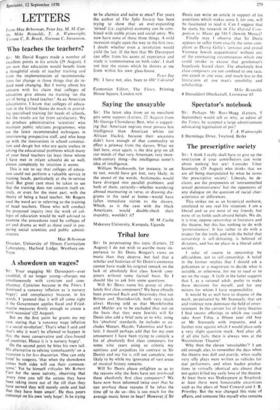LETTERS
From Max Beberman, Peter lay, M. M. Car- lin, Mike Reynolds, T. A. Wainwright, Yvonne C. R. Brock, Norman C. Stevenson.
Who teaches the teachers?
Sir: Mr David Rogers made a number of excellent points in his article (29 August). I am sure that education would benefit from a thoughtful study of teacher training and from the implementation of recommenda- tions for change in those things that do in- deed need changing. But I worry about his concern with his claim that colleges of education give almost no training 'on the art of being a head teacher.' As an American educationist, I know that colleges of educa- tion m the United States do much in provid- ing specialised training for heads of schools, but the results are far from satisfactory. We do produce administrative 'scientists' who maintain public relations programmes, who use the latest recommended techniques in interviewing prospective staff, and who keep up with the innovations in school construc- tion and design but who are quite useless in solving the educational problems which many of your head teachers (at least those whom I have met in infant schools) do so well, almost completely by intuition it seems.
This is not to say that colleges of educa- tion could not perform a valuable service in training heads, particularly at the in-service level. But great care must be taken to see that the training does not concern itself en- tirely, or even for the most part, with the theory of being a head teacher. Mr Rogers used the word art in referring to the training of head teachers. Those who will conduct the proposed inquiry into the work of col- leges of education would be well advised to examine the procedures used by colleges of art and drama as well as those used in pre- paring social scientists and public admini- strators.
Max Beberman Director, University of Illinois Curriculum Laboratory, Harford Lodge, Westbury-on- Trym














































 Previous page
Previous page